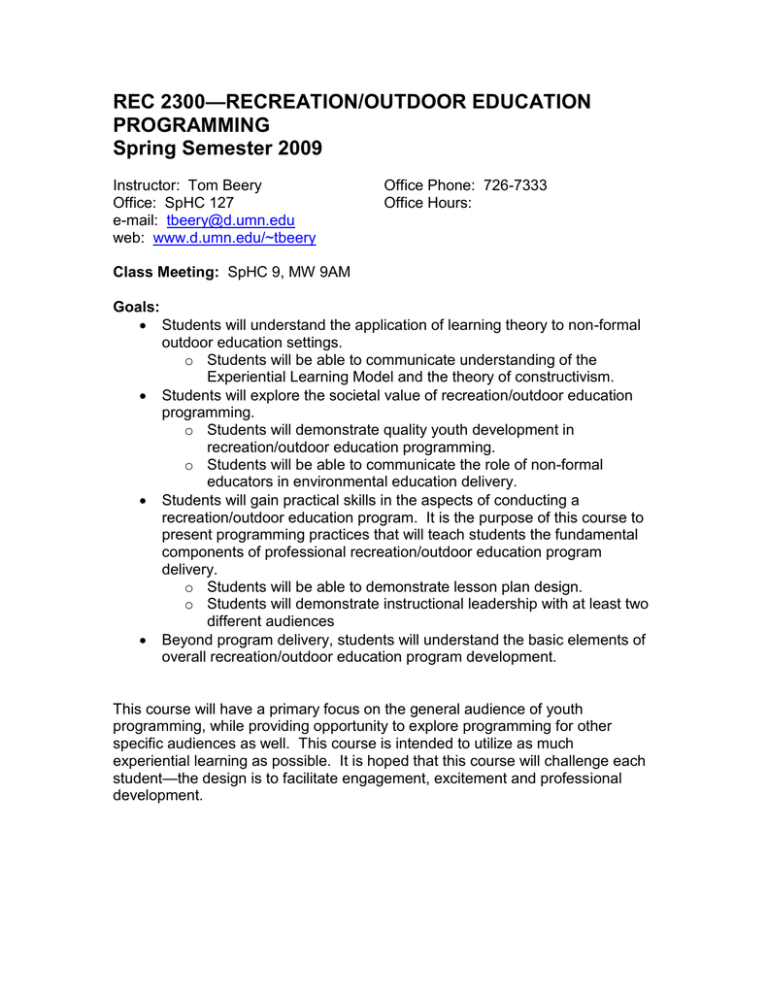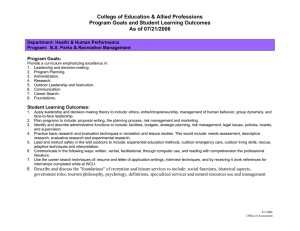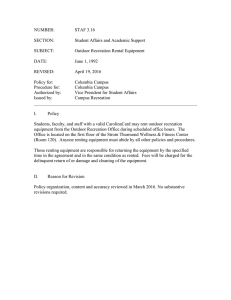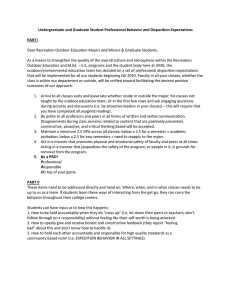—RECREATION/OUTDOOR EDUCATION REC 2300 PROGRAMMING Spring Semester 2009
advertisement

REC 2300—RECREATION/OUTDOOR EDUCATION PROGRAMMING Spring Semester 2009 Instructor: Tom Beery Office: SpHC 127 e-mail: tbeery@d.umn.edu web: www.d.umn.edu/~tbeery Office Phone: 726-7333 Office Hours: Class Meeting: SpHC 9, MW 9AM Goals: Students will understand the application of learning theory to non-formal outdoor education settings. o Students will be able to communicate understanding of the Experiential Learning Model and the theory of constructivism. Students will explore the societal value of recreation/outdoor education programming. o Students will demonstrate quality youth development in recreation/outdoor education programming. o Students will be able to communicate the role of non-formal educators in environmental education delivery. Students will gain practical skills in the aspects of conducting a recreation/outdoor education program. It is the purpose of this course to present programming practices that will teach students the fundamental components of professional recreation/outdoor education program delivery. o Students will be able to demonstrate lesson plan design. o Students will demonstrate instructional leadership with at least two different audiences Beyond program delivery, students will understand the basic elements of overall recreation/outdoor education program development. This course will have a primary focus on the general audience of youth programming, while providing opportunity to explore programming for other specific audiences as well. This course is intended to utilize as much experiential learning as possible. It is hoped that this course will challenge each student—the design is to facilitate engagement, excitement and professional development. Tentative Schedule: Week # & Date Topic Assignment—note, additional readings to be provided Introductions/course outline Week 1: Jan 19-23 Week 2: 26-30 Week 3: Feb. 2-6 Week 4: Feb. 9-13 Recreation, outdoor education and the non-formal setting Introduction to Programming Field Site Experiences Read: Benefits Based Introduced Programming (on-line) Outdoor Recreation, societal Field site choice values, repositioning Field site experience The value of games—games, begins introductions, conclusions and the concept of audience Chapter 4 in Field Days Project Wild Introduction Project Wild and overview Library resource tour Project Wild cont. MN Conservation volunteer assignment Field site week one discussion Field site audience description due (Mon.) Week 5: 16-20 Week 6 23-27 Week 7 March 2-6 Presentation 1: Game Field site teaching schedule confirmed Outline due with game relevent changes noted. Understanding Scope and Read: Pg. 66 and 67 in Sequence. Field Days Read: Designing Lessons Writing a Lesson Plan: Goals from Outdoor Education & Objectives…Assessment (electronic) The Keys to Positive Youth Lesson Plan 1 draft due Development for in-class editing Learning Theory Learning Theory Week 8 9-13 Lesson plan edit session Field Site check-in Week 9: 16-20 Week 10 23-27 Week 11: 30-April 3 Spring Break! Read: The Keys to Positive Youth Development Read: Learning and Teaching with Adults and Children (electronic) Read: Chapter 6 in Field Days Lesson plan #2 for Field Site Spring Break!! Behavior change via Read: Changing recreation and outdoor Conservation Behaviors education (electronic) Introduction to programming UMD Outdoor Program: programming for the UMD audience Programming guest speaker (TBA) Week 12: April 6-10 Programming Unit: 1. Program Culture 2. Strategic Direction Bagley Activity (Lesson plan 3) assigned/discussed Week 13: 13-17 3. Targeted Program Development 4. Operational Strategies 5. Program evaluation Read: Field Days OP small group projects Read: Evaluation of the Totally Cool, Totally Art Program (website) Chapter 7 Field Days Lesson Plan #3 for Bagley Week 14: 20-24 Week 15: 27- May 1 Week 16: May 4-8 Program evaluation cont. Field site assessment Bagley Activity Presentations Bagley Activity Presentations Field Site Reflection due Text: Rossman, R. & Schlatter, B. (2003). Recreation Programming. 4th Ed. Champaign, IL: Sagamore Publishing. (on-reserve) Field Days curriculum, University of Minnesota Extension Service Project Wild Materials Assignments/Grading 1. Field Site Experience 40 pts During class on the first week you will be provided with options for field sites. Starting week three, you will be provided a training at the field site. Each week you will need to complete ~3 hours of service for a total of 21 hours. (the weeks of ISD winter break, 2/18-22 and UMD spring break, 3/12-16 will not count). Continuation at the field site for the remainder of the semester will be worth an additional 20 points (extra credit for your positive contribution). 2. Field Site Audience Description After two weeks of attending and observing at Nettleton or Lowell, write a 3 page description of the “audience”…who are these kids? How do they act? What behaviors surprise you? Interest you? Scare you? Make at least three references to the content in Chapter 4 of Field Days. In addition you must explore one of the provided resources in Chapter 4 and relate the source to your experience at your field site. 20 points 3. Program Delivery: (80 pts total) Each presentation requires a lesson plan and an evaluation (1 instructor, 1 peer, 1 supervisor, 1 self). Presentation #1: Game with peers 20 pts Small group of three classmates facilitate a 20-30 minute, theme-based program for peers. Points earned via outline/lesson plan, preparedness and effort. Lesson/lesson plan #1: Game/s at field site 20 pts Facilitate programming w/intro, game/s, conclusion for field site group (min. 45 mins.). Points earned for lesson plan, preparedness and evaluation. Lesson/lesson plan #2: Project Wild activity at field site 20 pts Facilitate Project Wild activity w/ intro, activity and conclusion for volunteer site group (min. 45 min.). Points earned for lesson plan, preparedness, evaluation and appropriate fit with setting/audience. Lesson/lesson plan #3: Bagley activity for peers 20 pts Small group of three classmates facilitate a 20-30 minute adaptation of a Project Wild activity for peers. Points earned via presentation rubric. 4. Field Site Reflection Paper 20 pts Upon completion of your field site experience, you are required to write an essay using the experiential learning model to help you reflect and express. 5. Final Exam 100 pts. 6. Participation 100 pts (This includes attendance, class assignments and portfolio) Total ~360 pts. Course grades will be issued on a standard scale of the following: A = 100 - 93% A- = 92 - 90% B+ = 89 - 87% B = 86 - 83% B- = 82-80% C+ = 79-77% C = 76 - 73% C- = 72 - 70% D+ = 69 - 67% D = 66 - 63% D- = 62 - 60% Please note: All work must be presented in a typed format (Arial, Times). Even though some of the assignments are team/partner oriented, you must hand in the text aspect of the project individually. This is to encourage your own point of view toward what you learned from the exercise. You will hand in all work in a well organized, professionally presented 3-ring binder. Your presentations are expected to be completely professional, this includes: appropriate dress, quality communication with field site supervisors, delivery clarity, promptness and timeliness; tardiness is unacceptable. You must submit a complete lesson plan before each program is scheduled to be presented (see syllabus for detail). Late work will be accepted with a penalty score. Additional information regarding assignments will be handed out as each assignment approaches.


